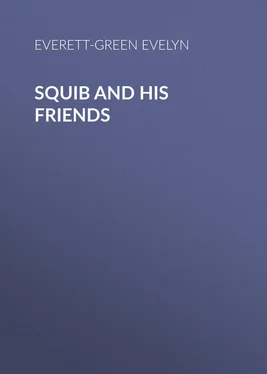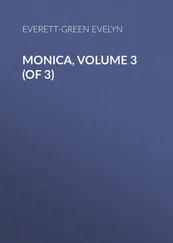Evelyn Everett-Green - Squib and His Friends
Здесь есть возможность читать онлайн «Evelyn Everett-Green - Squib and His Friends» — ознакомительный отрывок электронной книги совершенно бесплатно, а после прочтения отрывка купить полную версию. В некоторых случаях можно слушать аудио, скачать через торрент в формате fb2 и присутствует краткое содержание. Жанр: foreign_antique, foreign_prose, на английском языке. Описание произведения, (предисловие) а так же отзывы посетителей доступны на портале библиотеки ЛибКат.
- Название:Squib and His Friends
- Автор:
- Жанр:
- Год:неизвестен
- ISBN:нет данных
- Рейтинг книги:4 / 5. Голосов: 1
-
Избранное:Добавить в избранное
- Отзывы:
-
Ваша оценка:
- 80
- 1
- 2
- 3
- 4
- 5
Squib and His Friends: краткое содержание, описание и аннотация
Предлагаем к чтению аннотацию, описание, краткое содержание или предисловие (зависит от того, что написал сам автор книги «Squib and His Friends»). Если вы не нашли необходимую информацию о книге — напишите в комментариях, мы постараемся отыскать её.
Squib and His Friends — читать онлайн ознакомительный отрывок
Ниже представлен текст книги, разбитый по страницам. Система сохранения места последней прочитанной страницы, позволяет с удобством читать онлайн бесплатно книгу «Squib and His Friends», без необходимости каждый раз заново искать на чём Вы остановились. Поставьте закладку, и сможете в любой момент перейти на страницу, на которой закончили чтение.
Интервал:
Закладка:
Evelyn Everett-Green
Squib and His Friends
CHAPTER I.
“THE ODD ONE.”
That was the name Squib went by in the nursery and in the household – “the odd one.” Not exactly because of any personal peculiarities – although he had a few of these – but because he had no especial brother or sister belonging to him, and seemed to stand alone, whilst all the others could be paired off together.
Norman and Frank were big boys, away at school most of the year, near to each other in age, and always together in the holidays. Philippa and Molly came next, and were girls, devoted to each other and to their family of dolls, and even more devoted to the live dolls in the nursery – the little twin sisters, Hilda and Hulda, whom nobody knew apart save themselves and the nurse. But Squib had no brother or sister to be bracketed with him. The baby who came next in age to him had died in infancy, and was only a dim memory to the brother just above him in age. So he had always been, as it were, “the odd one” of the family, although his sisters were very fond of him, and never refused him a share in their games when he wanted to join in them.
But Squib did not care for dolls, and his tastes lay amongst things beyond the walls of nursery or schoolroom. He wanted always to be out of doors when not busy with his lessons for Mademoiselle (for so far he had not gone to school, but had been taught with his sisters in the schoolroom); and his pursuits were not of a kind to be attractive to the dainty little ladies, Philippa and Molly, or to find favour in the eyes of nurse, who reigned supreme over Hilda and Hulda. So Squib got into the way of amusing himself in his own fashion, and took his name of “the odd one” with great equanimity.
Squib was not his real name, as I suppose I need hardly say; it was a nickname given him by his father some years before my story begins, and it had stuck to him ever since. His real name was Sydenham, and he had been called Syd for a time, till Colonel Rutland had hit upon this other appellation.
And the reason for this was a habit of Squib’s which amused his father a good deal. The child had a way of sitting perfectly still and silent for a very long time in the room, not speaking, even when spoken to, until some exhaustive mental process had taken place, after which he would suddenly “go off,” as his father expressed it, and talk rapidly and eagerly for several minutes straight on end; then having thus relieved his mind and delivered himself of his thoughts, he would relapse into dead silence until ready for the next explosion. And so his father called him “Squib;” and Squib he became in time to the whole household.
It was commonly whispered about the place that Squib was the Colonel’s favourite amongst his children. Colonel Rutland was not a man who had taken a great deal of notice of his sons and daughters as they appeared upon the scene. He was a busy man, having a large estate to order, being a magistrate, churchwarden, and guardian of the poor-law, and having social duties to attend to as well. He was a most devoted husband; and people used to say that never was there a happier couple than he and Lady Mary, his beautiful wife. He was proud of his fine young family in the aggregate, but did not notice the children very much individually, until one or two small incidents brought Squib before his eyes.
The first of these was a severe altercation which he chanced to overhear between the child and his nurse when Squib was five years old. He was walking through the shrubberies one morning when the sound of raised voices attracted his attention, the first being that of a child lifted in indignant protest.
“It’s not a lie. I never tell lies! I did hear father sing it his own self!”
“Master Syd, that’s not true. Your father never would sing such a wicked song. It only makes it worse, telling stories about it!”
“It isn’t a story! – it isn’t, I tell you! I heard him my own self, and lots of other people heard him, too. It’s you who are wicked, saying I tell lies and father sings wicked songs!” and the crunch of the gravel betrayed the fact that Squib had brought his small foot heavily down upon it in a stamp of passionate wrath.
Colonel Rutland turned a corner and came full upon the combatants. The nurse – a most excellent and trustworthy woman, who had been for twelve years with them – was looking very grieved and disturbed as she held Squib by the hand, as if with the intention of taking him at once before some domestic tribunal; whilst the child’s square, determined face was flushed a deep crimson, his dark-grey eyes looked almost black, as they had a way of doing in moments of passion and excitement, and his whole frame was quivering with anger and protest as he reiterated his assertion that he was speaking nothing but the truth.
“What is all this?” asked Colonel Rutland in a deep voice. “Squib, what do you mean by resisting your nurse like that? I will have no insubordination to authority in my house – you know that as well as I do.” For Colonel Rutland, with his military training, was a martinet in his house about discipline, and his children knew perfectly that he would be more severe over an act of disobedience than over any other kind of transgression.
Squib and the nurse both started at the sound of the Colonel’s voice, and nurse dropped the hand she was holding and made a respectful courtesy to her master. Squib stood perfectly silent, after his fashion, for a full minute, and then burst into rapid speech, —
“I wasn’t resisting her, father. She told me I was telling lies – and I’m not. You did sing it. I heard you; and it isn’t wicked – and she didn’t ought to say it was. I don’t tell lies. I never did. It isn’t lies – it’s only about them!”
The Colonel held up his hand to command silence.
“What does all this mean?” he asked, turning to nurse.
“If you please, sir, I heard Master Syd singing something that didn’t sound right for a young gentleman, and when I told him I wouldn’t have wicked words sung, he turned and said that he’d heard you sing them, which I was quite sure was not true, and I told him so. And then he went off into one of his tantrums – which I hoped he was learning to get better of – and that’s all I know about it. But I am quite sure he is not speaking the truth.”
“Leave him to me and I will get at the rights of the matter,” said the Colonel; and nurse, who had an ailing baby indoors (Squib’s little brother who shortly afterwards died), was glad to go in to see after him, leaving Squib and his father to settle things together about the song.
“Now, Squib,” said Colonel Rutland, with grave severity of manner, “let me hear the whole truth of this from you. What is it you were singing? Don’t be afraid to speak the truth.”
“I’m not afraid a bit!” cried Squib, after his habitual pause. “I’ll sing it to you now. You’ll know it – it’s your own song,” and taking a deep breath and swelling himself out in unconscious imitation of a singer about to commence his song, the child broke out with the following words, sung in a deep voice as like that of a man as he could achieve —
“Fi-ive del dies —
The father of lies!”
And then suddenly breaking off he looked up at his father and cried, —
“You know you did sing it yourself, father – so it can’t be wicked!”
The Colonel was puzzled. There was something in the rhythm of the notes that was familiar to him; but what could the child mean? How had he got hold of those absurd words, and what was in his head?
“When did you hear me sing it, Squib?” he asked, still not permitting his face to relax.
Читать дальшеИнтервал:
Закладка:
Похожие книги на «Squib and His Friends»
Представляем Вашему вниманию похожие книги на «Squib and His Friends» списком для выбора. Мы отобрали схожую по названию и смыслу литературу в надежде предоставить читателям больше вариантов отыскать новые, интересные, ещё непрочитанные произведения.
Обсуждение, отзывы о книге «Squib and His Friends» и просто собственные мнения читателей. Оставьте ваши комментарии, напишите, что Вы думаете о произведении, его смысле или главных героях. Укажите что конкретно понравилось, а что нет, и почему Вы так считаете.












